Training a Gordon Setter can be an immensely rewarding journey. As one of the most intelligent, energetic, and loyal breeds, they require both mental and physical stimulation to thrive. In this essential guide, we will break down key elements of training Gordon Setter, from understanding their unique personality traits to the basics of creating a structured training regimen, ensuring success in both basic obedience and advanced training.
Table of Contents
Understanding Your Gordon Setter
Breed Characteristics and Personality Traits
Gordon Setters are known for their intelligence, loyalty, and high energy levels. Originally bred as hunting dogs, field bred Gordon Setters are typically smaller and leaner, prioritizing hunting abilities over appearance. They excel in retrieving game, and their natural instincts make them great trackers with a keen sense of smell. These dogs are agile, powerful, and adaptable, with an energetic temperament that can make them a challenge for first-time dog owners. However, their quick learning ability means they respond well to training when it’s done with patience and consistency.
Despite their hunting background, Gordon Setters are affectionate companions and often get along well with children and other pets, though socialization from an early age is crucial. They tend to be a bit jealous or possessive at times, so introducing them to new animals in the house in a gradual, controlled manner will help create a harmonious environment in your home.
In terms of size, Gordon Setters are medium to large dogs. Males typically weigh between 60-80 pounds and are well-built, with muscular legs that make them highly agile. Their black and tan coat is another defining characteristic, requiring regular grooming to keep it shiny and healthy. Regular training, alongside exercise, will help prevent boredom and ensure that they remain well-adjusted and happy.
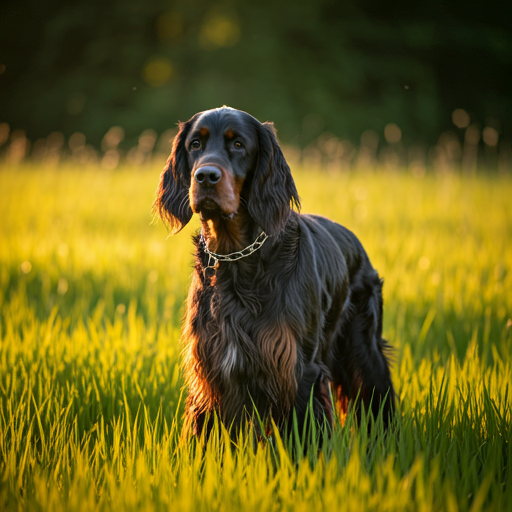
Characteristics of a Pointing Dog
A Gordon Setter, as a pointing dog, is a marvel of nature and training. Bred specifically to locate and point game birds, these dogs possess an extraordinary prey drive and a keen sense of smell. This allows them to detect and track birds with remarkable precision. When a Gordon Setter locates a bird, they freeze in place, pointing towards the game, which signals the hunter to its location. This behavior is not only instinctual but also honed through dedicated training.
Pointing dogs like the Gordon Setter are highly intelligent and trainable, making them a favorite among hunters and dog enthusiasts. Their ability to work in various environments and conditions showcases their adaptability and resilience. However, their high energy levels mean they require regular exercise and mental stimulation to prevent boredom and destructive behavior.
Despite their hunting prowess, Gordon Setters are loyal and loving companions. Their affectionate nature makes them excellent family dogs, blending the best of both worlds – a skilled hunting partner and a devoted family member.
Basic Obedience Training
Building a Strong Foundation
The first step in training your Gordon Setter is establishing a foundation of basic obedience. Begin with simple commands like “sit,” “stay,” “come,” and “down.” Using positive reinforcement techniques, such as treats, praise, and toys, will make the learning process enjoyable for your dog. Gordon Setters are highly intelligent and learn quickly, so consistency and repetition are key to reinforcing these basic commands.
Ensure that all members of your household are on the same page when it comes to training. New owners must begin training immediately to ensure the puppy adjusts well to its new environment. It’s important to establish consistent rules and commands to avoid confusion. For example, if one person allows the dog to jump up and another doesn’t, your Gordon Setter will likely become confused about what behavior is expected.
Consider enrolling your pup in a puppy pre-school or basic obedience class, where your Gordon Setter will not only learn key skills but also get an early introduction to other dogs and different environments. These experiences help your dog become well-rounded and confident in social settings.
Formal Training Starts Early
Start formal training at around 12 weeks of age. Training a Gordon puppy early is crucial for proper development and behavior. At this stage, your Gordon Setter is more than capable of grasping basic commands. Keep training sessions short (5-10 minutes) to maintain their attention and enthusiasm. Remember to keep it fun – Gordon Setters are eager to please and will respond best when the training feels like a game.
As your puppy matures, gradually introduce more complex commands and tasks. You can move from basic obedience to teaching them advanced skills, such as “heel,” “leave it,” and “place.” Keep the training varied and rewarding to prevent them from losing interest.

Exercise and Physical Activity
Meeting Your Gordon Setter’s Needs
Gordon Setters have a lot of energy to burn, so providing them with regular exercise is essential for their well-being. These dogs thrive on physical activity, and a lack of exercise can lead to destructive behavior, anxiety, and frustration.
Daily walks, runs, or hikes are essential for keeping your Gordon Setter physically fit. They also enjoy interactive playtime, such as fetch or playing with other dogs. Agility courses, if available, can also be an excellent way to challenge their bodies and minds simultaneously. Physical exercise will also help burn off excess energy that might otherwise lead to behavioral problems.
Mental Stimulation
In addition to physical exercise, Gordon Setters need mental stimulation to stay happy and healthy. Mental exercises like puzzle toys, scent work, and learning new tricks will engage your dog’s mind and prevent them from becoming bored. Boredom is one of the main causes of destructive behavior in intelligent breeds like the Gordon Setter.
If you have access to a securely fenced yard, provide your dog with off-leash time to explore and run freely. Dog parks or playdates with other dogs or kids are also beneficial for their socialization and physical activity.
Hunting and Retrieving Game Birds
As natural hunters, Gordon Setters thrive in environments that tap into their instincts. If you’re a hunter or have access to hunting areas, incorporating game bird retrieval into your training can provide great mental and physical stimulation. Start with basic fetch games using training dummies or soft toys, and gradually introduce scents and real game birds. Incorporating wild birds into training sessions helps reinforce natural instincts and skills. This will allow your Gordon Setter to engage in the activities they were bred for, providing them with a sense of purpose and fulfillment.
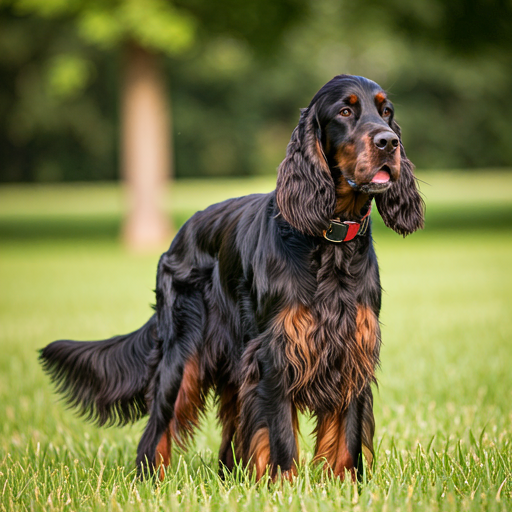
Health and Care
Common Health Issues and Prevention
Like all dog breeds, Gordon Setters are susceptible to certain health conditions. The most common health concerns include hip dysplasia, hypothyroidism, and eye diseases like progressive retinal atrophy. These conditions can be managed through regular check-ups and early intervention.
Hip dysplasia, a hereditary condition that causes the hip joint to develop abnormally, can lead to pain and arthritis. Regular vet visits and screenings can help detect this condition early, allowing for proper management.
Hypothyroidism, a condition where the thyroid doesn’t produce enough hormones, can cause weight gain, lethargy, and skin issues. This condition is treatable with medication, so be sure to monitor your dog’s energy levels and weight.
Eye diseases, such as progressive retinal atrophy, are more common in the breed. Regular eye exams can help the breeder catch these issues early and ensure proper care.
A high-quality diet and consistent exercise can also help keep your Gordon Setter in top shape, improving their longevity and quality of life.
Fueling Your Dog’s Success
Ensuring your Gordon Setter’s success starts with providing a balanced and nutritious diet. High-quality dog food that meets their specific nutritional needs is crucial for maintaining optimal health and performance. Regular exercise and mental stimulation are equally important, helping to prevent boredom and destructive behavior.
Positive reinforcement training is an effective method for teaching your dog new skills and behaviors. Consistency and clear communication are key to successful training and building a strong bond between you and your Gordon Setter. Socialization is also vital for their emotional and psychological development, helping them build confidence and remain calm in new situations.
Creating a safe and comfortable living space is essential for your dog’s physical and emotional well-being. This includes providing a cozy crate and bedding where they can retreat and feel secure. By addressing these fundamental needs, you set the stage for a happy, healthy, and well-adjusted Gordon Setter.
Grooming and Hygiene
Keeping Your Gordon Setter Clean and Well-Groomed
Gordon Setters have a beautiful black and tan coat that requires regular grooming to maintain its shine and softness. Their medium-length fur tends to shed, so regular brushing will help keep loose hair under control and prevent mats from forming.
Trim the hair around their feet and tail and regularly clip their nails to prevent discomfort. Additionally, check their ears regularly, as Gordon Setters are prone to ear infections due to their floppy ears. Keeping them clean and dry is important for preventing any issues.
Bathing and Coat Care
Bathing your Gordon Setter once every few weeks or as needed is essential to remove dirt and debris. Be sure to use a dog-safe shampoo to keep their coat healthy. Regular grooming not only helps maintain their appearance but also gives you an opportunity to check for signs of skin conditions or parasites.
Training Your Hunting Dog
Preparing Your Gordon Setter for the Field
If you plan to train your Gordon Setter for hunting, start early to take advantage of their natural instincts. Begin by introducing them to the sights and smells of the field and ensure they associate these experiences with positive outcomes.
You can start training with basic search and retrieve commands and gradually move to more complex tasks, such as retrieving game birds from varying distances or in challenging terrain. Positive reinforcement is key during these sessions, and always reward your Gordon Setter with praise or treats when they perform well.
As your dog matures, you can continue to increase the difficulty of their tasks, ensuring they are always challenged and mentally engaged. Participating in field trials or hunting events is an excellent way to bond with your Gordon Setter while giving them the opportunity to demonstrate their skills.

Advanced Training Techniques
Socialization and Training in Public
As your Gordon Setter grows, it’s important to continue socialization and introduce them to new environments. This helps them learn to cope with distractions and remain focused on you, even in public places. Socialization is a key component of advanced training, and exposing your dog to new people, animals, and settings will help them become more adaptable.
Training your dog in public also helps build confidence and reduces the chances of anxiety or aggression when encountering new experiences. Practice commands in various settings to help teach your dog generalize their skills to different situations.
Overcoming Training Challenges
Training Gordon Setters can come with challenges, such as stubbornness or a tendency to get distracted by their surroundings. Since they are independent thinkers, they may not always respond immediately to commands. It’s important to remain patient and persistent, avoiding punishment-based techniques. Instead, focus on positive reinforcement methods, such as rewarding good behavior with treats and praise.
Common Behavioral Issues
Like all dogs, Gordon Setters can exhibit common behavioral issues that require attention and training. Barking and whining often stem from boredom, anxiety, or a desire for attention. Chewing and digging are also prevalent, especially in puppies, and can be caused by teething, boredom, or anxiety.
Housebreaking issues are common in young puppies but can be managed with consistency, patience, and positive reinforcement training. More serious behavioral problems, such as fear and aggression, may require professional help and specialized training techniques.
Separation anxiety is of course another common issue, leading to distress and destructive behavior when your dog is left alone. Resource guarding, where a dog becomes protective of food, toys, or other items, is also a behavior that needs addressing.
With patience, consistency, and positive reinforcement, many of these common behavioral issues can be resolved. However, it’s important to recognize when professional help is needed to ensure the well-being of your Gordon Setter and maintain a harmonious household.
Finding the Right Support
Using the right training tools is essential for training your Gordon Setter effectively. Clicker training is a popular method that uses a distinct sound to mark good behavior, followed by a treat. You can also use training dummies, toys, and high-value treats to reinforce desired behaviors and keep your dog motivated.
If you’re encountering challenges, consider consulting a well trained professional trainer who specializes in hunting dogs or breeds like the Gordon Setter. They can offer tailored advice and help you overcome specific training issues.
National Breed Clubs and Resources
Joining a breed-specific club like the Gordon Setter Club of America can provide you with valuable resources and support. These clubs offer advice on training, health, eating and care, as well as opportunities to connect with other Gordon Setter owners.
By participating in breed-specific clubs and online forums, you can learn from other experienced owners, share your own experiences, and gain valuable tips and insights into how to best care for and train your Gordon Setter.
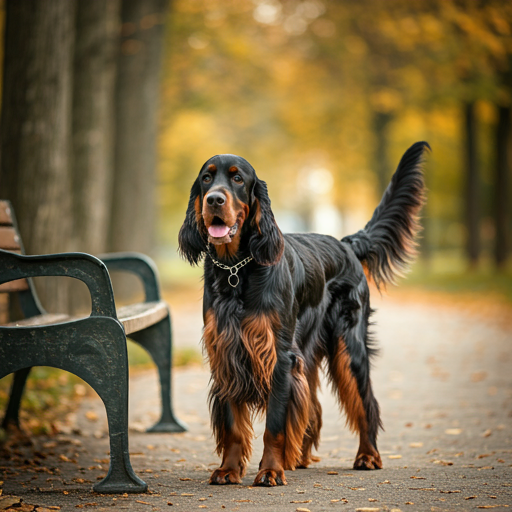
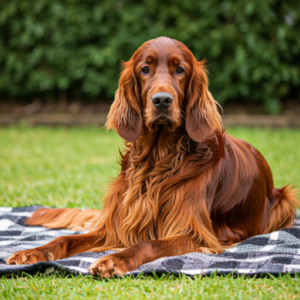
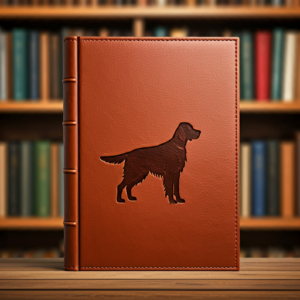

Pingback: The Ultimate Gordon Setter Guide: Everything You Need to Know About This Majestic Breed - Setterpedia
Pingback: Essential Tips for Training an Irish Setter Puppy Successfully - Setterpedia